Organizational Behaviour: BBC Culture, Teams, and Theories Report
VerifiedAdded on 2023/01/16
|12
|3282
|61
Report
AI Summary
This report provides a comprehensive analysis of the British Broadcasting Company's (BBC) organizational behaviour. It begins with an introduction to organizational behaviour and its impact on performance, motivation, and job structure. The report then delves into the BBC's organizational culture, utilizing Handy's Model to examine power, task, person, and role cultures, along with an analysis of organizational politics and power dynamics. It further explores motivational theories, including McClelland's Theory of Needs, content theories, and process theories like expectancy and equity theory. The report also discusses motivational techniques such as employee engagement, promoting equality, and rewards. Additionally, it examines effective and ineffective teams, using Tuckman's theory of group development to highlight communication, cooperation, and leadership. The report concludes with an evaluation of organizational behaviour concepts and theories, providing a detailed overview of how these concepts influence business situations and employee behaviour within the BBC.
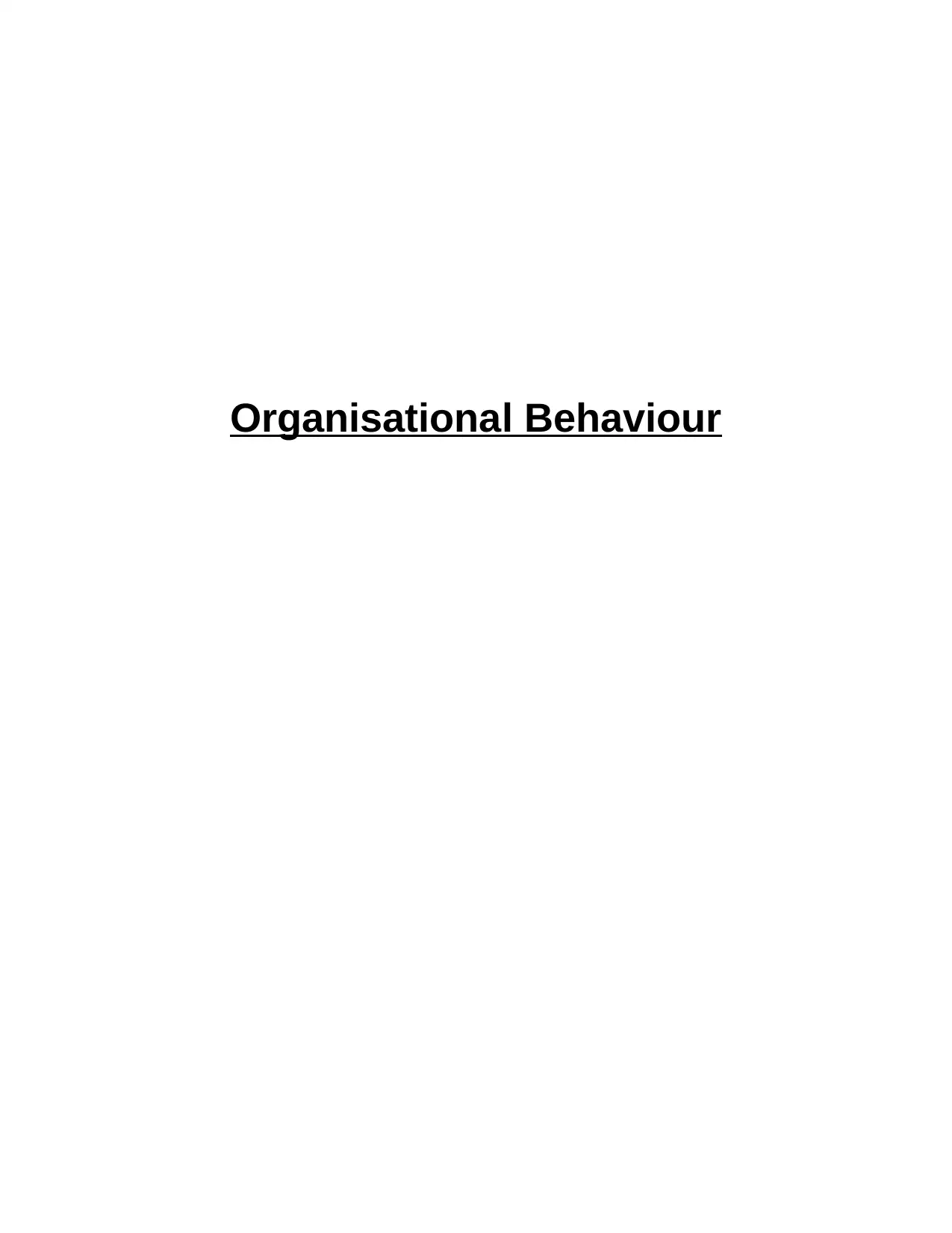
Organisational Behaviour
Paraphrase This Document
Need a fresh take? Get an instant paraphrase of this document with our AI Paraphraser
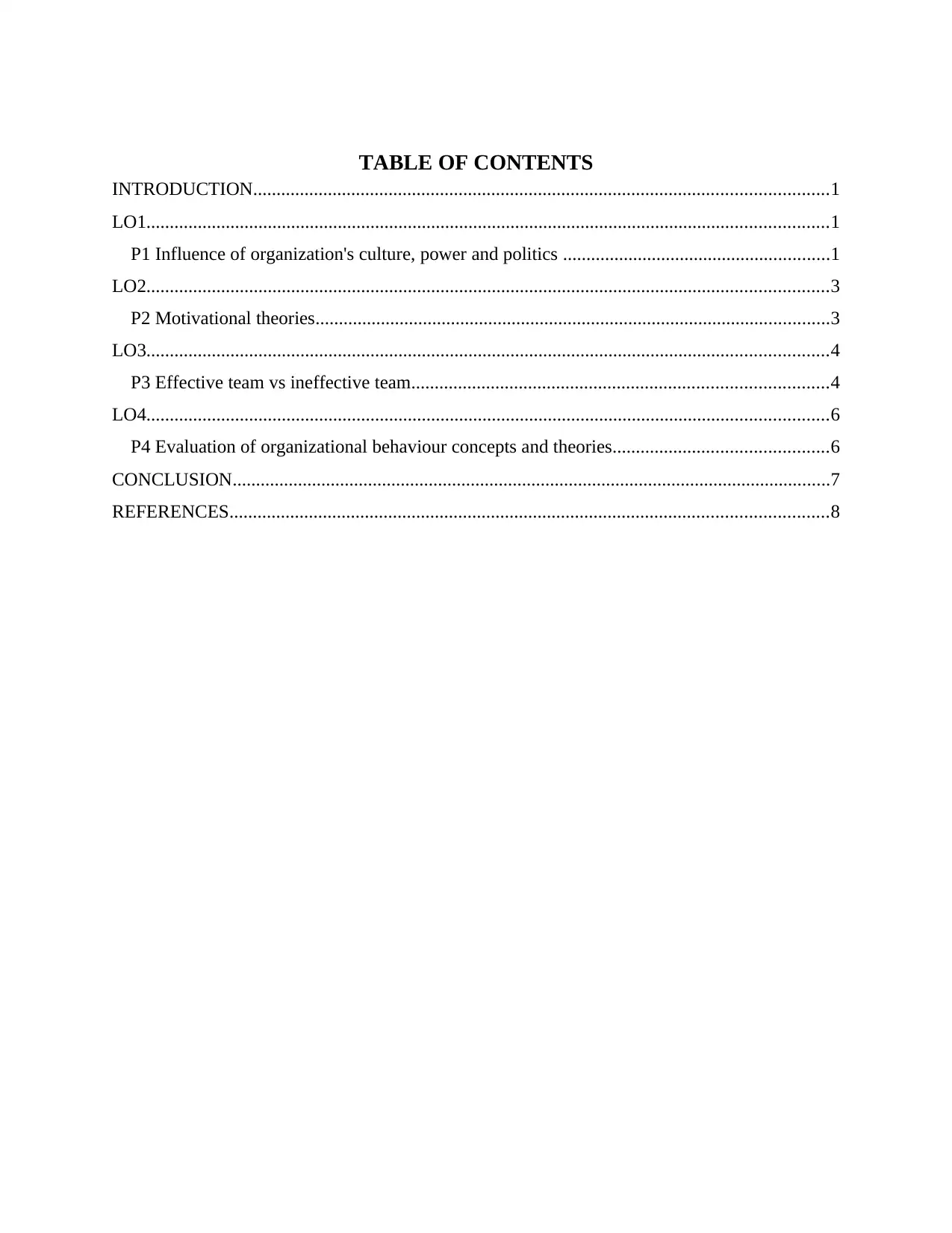
TABLE OF CONTENTS
INTRODUCTION...........................................................................................................................1
LO1..................................................................................................................................................1
P1 Influence of organization's culture, power and politics .........................................................1
LO2..................................................................................................................................................3
P2 Motivational theories..............................................................................................................3
LO3..................................................................................................................................................4
P3 Effective team vs ineffective team.........................................................................................4
LO4..................................................................................................................................................6
P4 Evaluation of organizational behaviour concepts and theories..............................................6
CONCLUSION................................................................................................................................7
REFERENCES................................................................................................................................8
INTRODUCTION...........................................................................................................................1
LO1..................................................................................................................................................1
P1 Influence of organization's culture, power and politics .........................................................1
LO2..................................................................................................................................................3
P2 Motivational theories..............................................................................................................3
LO3..................................................................................................................................................4
P3 Effective team vs ineffective team.........................................................................................4
LO4..................................................................................................................................................6
P4 Evaluation of organizational behaviour concepts and theories..............................................6
CONCLUSION................................................................................................................................7
REFERENCES................................................................................................................................8
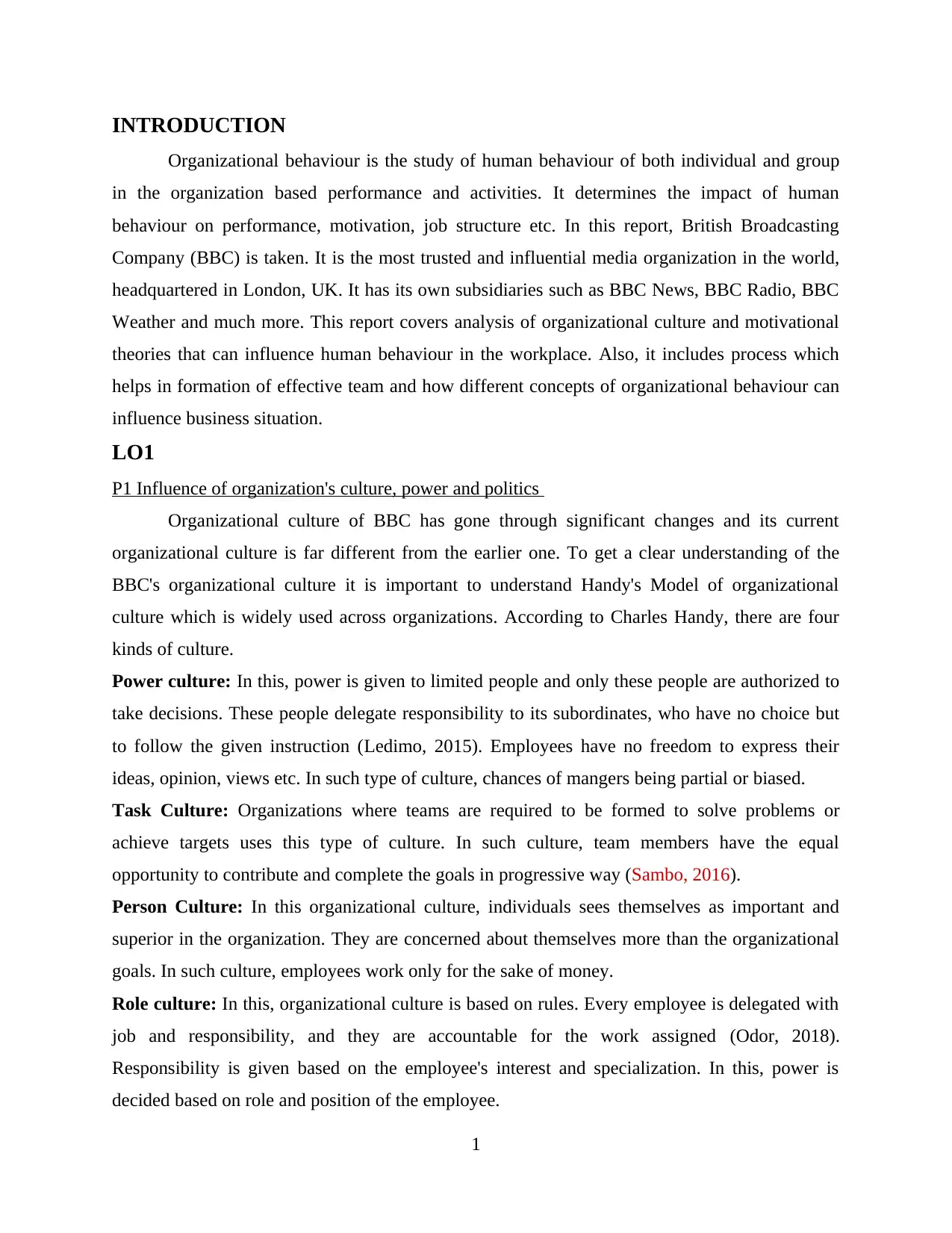
INTRODUCTION
Organizational behaviour is the study of human behaviour of both individual and group
in the organization based performance and activities. It determines the impact of human
behaviour on performance, motivation, job structure etc. In this report, British Broadcasting
Company (BBC) is taken. It is the most trusted and influential media organization in the world,
headquartered in London, UK. It has its own subsidiaries such as BBC News, BBC Radio, BBC
Weather and much more. This report covers analysis of organizational culture and motivational
theories that can influence human behaviour in the workplace. Also, it includes process which
helps in formation of effective team and how different concepts of organizational behaviour can
influence business situation.
LO1
P1 Influence of organization's culture, power and politics
Organizational culture of BBC has gone through significant changes and its current
organizational culture is far different from the earlier one. To get a clear understanding of the
BBC's organizational culture it is important to understand Handy's Model of organizational
culture which is widely used across organizations. According to Charles Handy, there are four
kinds of culture.
Power culture: In this, power is given to limited people and only these people are authorized to
take decisions. These people delegate responsibility to its subordinates, who have no choice but
to follow the given instruction (Ledimo, 2015). Employees have no freedom to express their
ideas, opinion, views etc. In such type of culture, chances of mangers being partial or biased.
Task Culture: Organizations where teams are required to be formed to solve problems or
achieve targets uses this type of culture. In such culture, team members have the equal
opportunity to contribute and complete the goals in progressive way (Sambo, 2016).
Person Culture: In this organizational culture, individuals sees themselves as important and
superior in the organization. They are concerned about themselves more than the organizational
goals. In such culture, employees work only for the sake of money.
Role culture: In this, organizational culture is based on rules. Every employee is delegated with
job and responsibility, and they are accountable for the work assigned (Odor, 2018).
Responsibility is given based on the employee's interest and specialization. In this, power is
decided based on role and position of the employee.
1
Organizational behaviour is the study of human behaviour of both individual and group
in the organization based performance and activities. It determines the impact of human
behaviour on performance, motivation, job structure etc. In this report, British Broadcasting
Company (BBC) is taken. It is the most trusted and influential media organization in the world,
headquartered in London, UK. It has its own subsidiaries such as BBC News, BBC Radio, BBC
Weather and much more. This report covers analysis of organizational culture and motivational
theories that can influence human behaviour in the workplace. Also, it includes process which
helps in formation of effective team and how different concepts of organizational behaviour can
influence business situation.
LO1
P1 Influence of organization's culture, power and politics
Organizational culture of BBC has gone through significant changes and its current
organizational culture is far different from the earlier one. To get a clear understanding of the
BBC's organizational culture it is important to understand Handy's Model of organizational
culture which is widely used across organizations. According to Charles Handy, there are four
kinds of culture.
Power culture: In this, power is given to limited people and only these people are authorized to
take decisions. These people delegate responsibility to its subordinates, who have no choice but
to follow the given instruction (Ledimo, 2015). Employees have no freedom to express their
ideas, opinion, views etc. In such type of culture, chances of mangers being partial or biased.
Task Culture: Organizations where teams are required to be formed to solve problems or
achieve targets uses this type of culture. In such culture, team members have the equal
opportunity to contribute and complete the goals in progressive way (Sambo, 2016).
Person Culture: In this organizational culture, individuals sees themselves as important and
superior in the organization. They are concerned about themselves more than the organizational
goals. In such culture, employees work only for the sake of money.
Role culture: In this, organizational culture is based on rules. Every employee is delegated with
job and responsibility, and they are accountable for the work assigned (Odor, 2018).
Responsibility is given based on the employee's interest and specialization. In this, power is
decided based on role and position of the employee.
1
⊘ This is a preview!⊘
Do you want full access?
Subscribe today to unlock all pages.

Trusted by 1+ million students worldwide
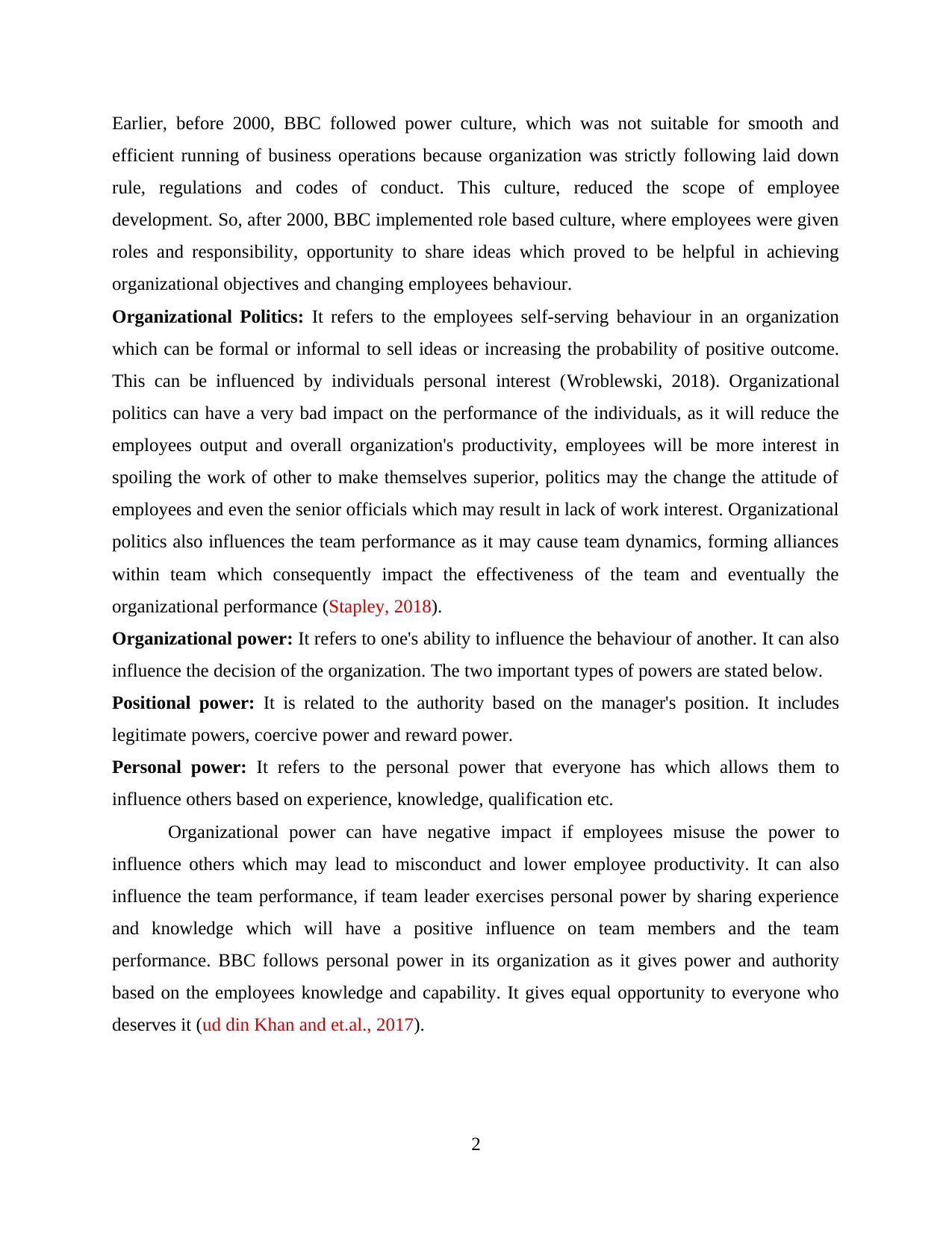
Earlier, before 2000, BBC followed power culture, which was not suitable for smooth and
efficient running of business operations because organization was strictly following laid down
rule, regulations and codes of conduct. This culture, reduced the scope of employee
development. So, after 2000, BBC implemented role based culture, where employees were given
roles and responsibility, opportunity to share ideas which proved to be helpful in achieving
organizational objectives and changing employees behaviour.
Organizational Politics: It refers to the employees self-serving behaviour in an organization
which can be formal or informal to sell ideas or increasing the probability of positive outcome.
This can be influenced by individuals personal interest (Wroblewski, 2018). Organizational
politics can have a very bad impact on the performance of the individuals, as it will reduce the
employees output and overall organization's productivity, employees will be more interest in
spoiling the work of other to make themselves superior, politics may the change the attitude of
employees and even the senior officials which may result in lack of work interest. Organizational
politics also influences the team performance as it may cause team dynamics, forming alliances
within team which consequently impact the effectiveness of the team and eventually the
organizational performance (Stapley, 2018).
Organizational power: It refers to one's ability to influence the behaviour of another. It can also
influence the decision of the organization. The two important types of powers are stated below.
Positional power: It is related to the authority based on the manager's position. It includes
legitimate powers, coercive power and reward power.
Personal power: It refers to the personal power that everyone has which allows them to
influence others based on experience, knowledge, qualification etc.
Organizational power can have negative impact if employees misuse the power to
influence others which may lead to misconduct and lower employee productivity. It can also
influence the team performance, if team leader exercises personal power by sharing experience
and knowledge which will have a positive influence on team members and the team
performance. BBC follows personal power in its organization as it gives power and authority
based on the employees knowledge and capability. It gives equal opportunity to everyone who
deserves it (ud din Khan and et.al., 2017).
2
efficient running of business operations because organization was strictly following laid down
rule, regulations and codes of conduct. This culture, reduced the scope of employee
development. So, after 2000, BBC implemented role based culture, where employees were given
roles and responsibility, opportunity to share ideas which proved to be helpful in achieving
organizational objectives and changing employees behaviour.
Organizational Politics: It refers to the employees self-serving behaviour in an organization
which can be formal or informal to sell ideas or increasing the probability of positive outcome.
This can be influenced by individuals personal interest (Wroblewski, 2018). Organizational
politics can have a very bad impact on the performance of the individuals, as it will reduce the
employees output and overall organization's productivity, employees will be more interest in
spoiling the work of other to make themselves superior, politics may the change the attitude of
employees and even the senior officials which may result in lack of work interest. Organizational
politics also influences the team performance as it may cause team dynamics, forming alliances
within team which consequently impact the effectiveness of the team and eventually the
organizational performance (Stapley, 2018).
Organizational power: It refers to one's ability to influence the behaviour of another. It can also
influence the decision of the organization. The two important types of powers are stated below.
Positional power: It is related to the authority based on the manager's position. It includes
legitimate powers, coercive power and reward power.
Personal power: It refers to the personal power that everyone has which allows them to
influence others based on experience, knowledge, qualification etc.
Organizational power can have negative impact if employees misuse the power to
influence others which may lead to misconduct and lower employee productivity. It can also
influence the team performance, if team leader exercises personal power by sharing experience
and knowledge which will have a positive influence on team members and the team
performance. BBC follows personal power in its organization as it gives power and authority
based on the employees knowledge and capability. It gives equal opportunity to everyone who
deserves it (ud din Khan and et.al., 2017).
2
Paraphrase This Document
Need a fresh take? Get an instant paraphrase of this document with our AI Paraphraser
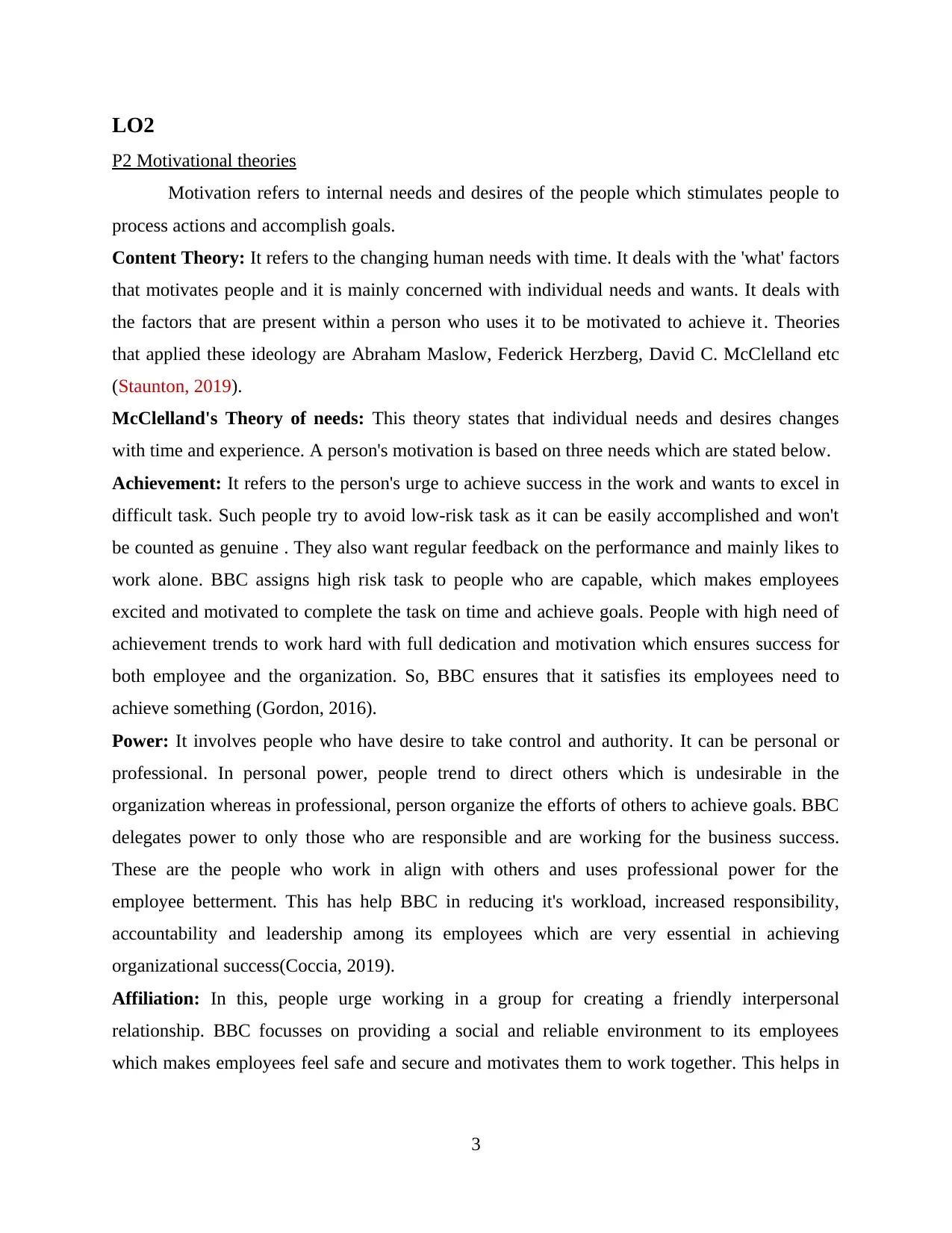
LO2
P2 Motivational theories
Motivation refers to internal needs and desires of the people which stimulates people to
process actions and accomplish goals.
Content Theory: It refers to the changing human needs with time. It deals with the 'what' factors
that motivates people and it is mainly concerned with individual needs and wants. It deals with
the factors that are present within a person who uses it to be motivated to achieve it. Theories
that applied these ideology are Abraham Maslow, Federick Herzberg, David C. McClelland etc
(Staunton, 2019).
McClelland's Theory of needs: This theory states that individual needs and desires changes
with time and experience. A person's motivation is based on three needs which are stated below.
Achievement: It refers to the person's urge to achieve success in the work and wants to excel in
difficult task. Such people try to avoid low-risk task as it can be easily accomplished and won't
be counted as genuine . They also want regular feedback on the performance and mainly likes to
work alone. BBC assigns high risk task to people who are capable, which makes employees
excited and motivated to complete the task on time and achieve goals. People with high need of
achievement trends to work hard with full dedication and motivation which ensures success for
both employee and the organization. So, BBC ensures that it satisfies its employees need to
achieve something (Gordon, 2016).
Power: It involves people who have desire to take control and authority. It can be personal or
professional. In personal power, people trend to direct others which is undesirable in the
organization whereas in professional, person organize the efforts of others to achieve goals. BBC
delegates power to only those who are responsible and are working for the business success.
These are the people who work in align with others and uses professional power for the
employee betterment. This has help BBC in reducing it's workload, increased responsibility,
accountability and leadership among its employees which are very essential in achieving
organizational success(Coccia, 2019).
Affiliation: In this, people urge working in a group for creating a friendly interpersonal
relationship. BBC focusses on providing a social and reliable environment to its employees
which makes employees feel safe and secure and motivates them to work together. This helps in
3
P2 Motivational theories
Motivation refers to internal needs and desires of the people which stimulates people to
process actions and accomplish goals.
Content Theory: It refers to the changing human needs with time. It deals with the 'what' factors
that motivates people and it is mainly concerned with individual needs and wants. It deals with
the factors that are present within a person who uses it to be motivated to achieve it. Theories
that applied these ideology are Abraham Maslow, Federick Herzberg, David C. McClelland etc
(Staunton, 2019).
McClelland's Theory of needs: This theory states that individual needs and desires changes
with time and experience. A person's motivation is based on three needs which are stated below.
Achievement: It refers to the person's urge to achieve success in the work and wants to excel in
difficult task. Such people try to avoid low-risk task as it can be easily accomplished and won't
be counted as genuine . They also want regular feedback on the performance and mainly likes to
work alone. BBC assigns high risk task to people who are capable, which makes employees
excited and motivated to complete the task on time and achieve goals. People with high need of
achievement trends to work hard with full dedication and motivation which ensures success for
both employee and the organization. So, BBC ensures that it satisfies its employees need to
achieve something (Gordon, 2016).
Power: It involves people who have desire to take control and authority. It can be personal or
professional. In personal power, people trend to direct others which is undesirable in the
organization whereas in professional, person organize the efforts of others to achieve goals. BBC
delegates power to only those who are responsible and are working for the business success.
These are the people who work in align with others and uses professional power for the
employee betterment. This has help BBC in reducing it's workload, increased responsibility,
accountability and leadership among its employees which are very essential in achieving
organizational success(Coccia, 2019).
Affiliation: In this, people urge working in a group for creating a friendly interpersonal
relationship. BBC focusses on providing a social and reliable environment to its employees
which makes employees feel safe and secure and motivates them to work together. This helps in
3
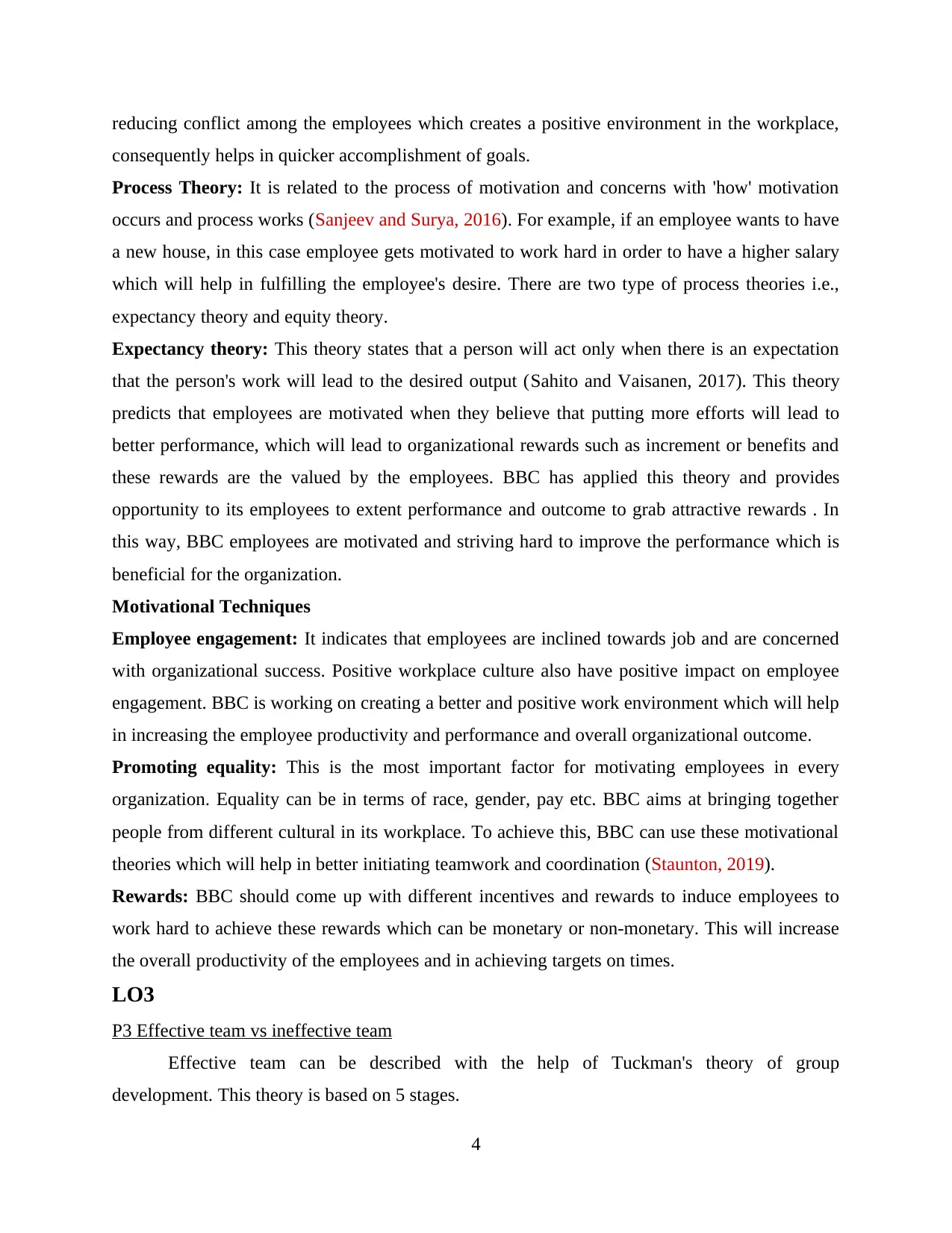
reducing conflict among the employees which creates a positive environment in the workplace,
consequently helps in quicker accomplishment of goals.
Process Theory: It is related to the process of motivation and concerns with 'how' motivation
occurs and process works (Sanjeev and Surya, 2016). For example, if an employee wants to have
a new house, in this case employee gets motivated to work hard in order to have a higher salary
which will help in fulfilling the employee's desire. There are two type of process theories i.e.,
expectancy theory and equity theory.
Expectancy theory: This theory states that a person will act only when there is an expectation
that the person's work will lead to the desired output (Sahito and Vaisanen, 2017). This theory
predicts that employees are motivated when they believe that putting more efforts will lead to
better performance, which will lead to organizational rewards such as increment or benefits and
these rewards are the valued by the employees. BBC has applied this theory and provides
opportunity to its employees to extent performance and outcome to grab attractive rewards . In
this way, BBC employees are motivated and striving hard to improve the performance which is
beneficial for the organization.
Motivational Techniques
Employee engagement: It indicates that employees are inclined towards job and are concerned
with organizational success. Positive workplace culture also have positive impact on employee
engagement. BBC is working on creating a better and positive work environment which will help
in increasing the employee productivity and performance and overall organizational outcome.
Promoting equality: This is the most important factor for motivating employees in every
organization. Equality can be in terms of race, gender, pay etc. BBC aims at bringing together
people from different cultural in its workplace. To achieve this, BBC can use these motivational
theories which will help in better initiating teamwork and coordination (Staunton, 2019).
Rewards: BBC should come up with different incentives and rewards to induce employees to
work hard to achieve these rewards which can be monetary or non-monetary. This will increase
the overall productivity of the employees and in achieving targets on times.
LO3
P3 Effective team vs ineffective team
Effective team can be described with the help of Tuckman's theory of group
development. This theory is based on 5 stages.
4
consequently helps in quicker accomplishment of goals.
Process Theory: It is related to the process of motivation and concerns with 'how' motivation
occurs and process works (Sanjeev and Surya, 2016). For example, if an employee wants to have
a new house, in this case employee gets motivated to work hard in order to have a higher salary
which will help in fulfilling the employee's desire. There are two type of process theories i.e.,
expectancy theory and equity theory.
Expectancy theory: This theory states that a person will act only when there is an expectation
that the person's work will lead to the desired output (Sahito and Vaisanen, 2017). This theory
predicts that employees are motivated when they believe that putting more efforts will lead to
better performance, which will lead to organizational rewards such as increment or benefits and
these rewards are the valued by the employees. BBC has applied this theory and provides
opportunity to its employees to extent performance and outcome to grab attractive rewards . In
this way, BBC employees are motivated and striving hard to improve the performance which is
beneficial for the organization.
Motivational Techniques
Employee engagement: It indicates that employees are inclined towards job and are concerned
with organizational success. Positive workplace culture also have positive impact on employee
engagement. BBC is working on creating a better and positive work environment which will help
in increasing the employee productivity and performance and overall organizational outcome.
Promoting equality: This is the most important factor for motivating employees in every
organization. Equality can be in terms of race, gender, pay etc. BBC aims at bringing together
people from different cultural in its workplace. To achieve this, BBC can use these motivational
theories which will help in better initiating teamwork and coordination (Staunton, 2019).
Rewards: BBC should come up with different incentives and rewards to induce employees to
work hard to achieve these rewards which can be monetary or non-monetary. This will increase
the overall productivity of the employees and in achieving targets on times.
LO3
P3 Effective team vs ineffective team
Effective team can be described with the help of Tuckman's theory of group
development. This theory is based on 5 stages.
4
⊘ This is a preview!⊘
Do you want full access?
Subscribe today to unlock all pages.

Trusted by 1+ million students worldwide
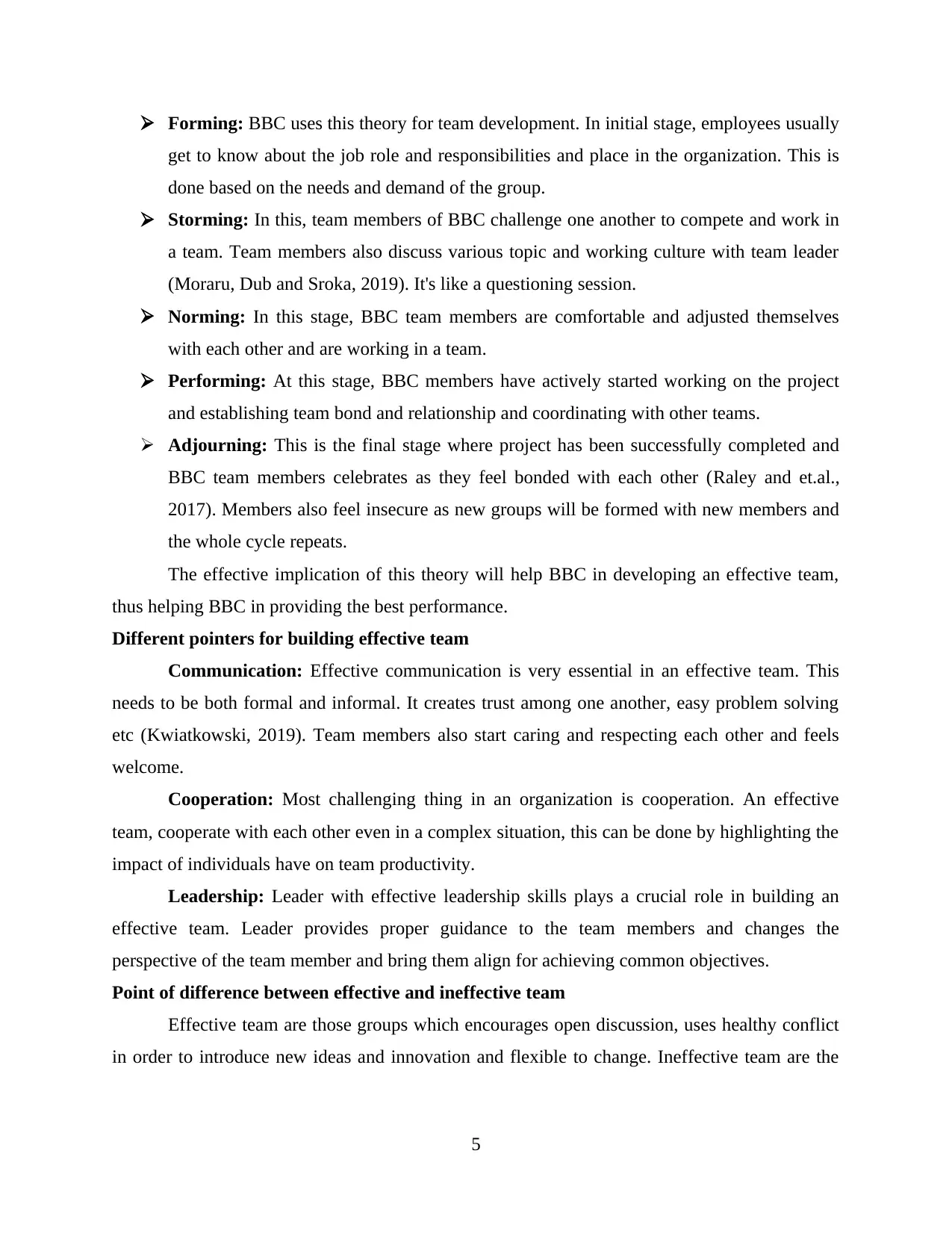
Forming: BBC uses this theory for team development. In initial stage, employees usually
get to know about the job role and responsibilities and place in the organization. This is
done based on the needs and demand of the group.
Storming: In this, team members of BBC challenge one another to compete and work in
a team. Team members also discuss various topic and working culture with team leader
(Moraru, Dub and Sroka, 2019). It's like a questioning session.
Norming: In this stage, BBC team members are comfortable and adjusted themselves
with each other and are working in a team.
Performing: At this stage, BBC members have actively started working on the project
and establishing team bond and relationship and coordinating with other teams.
Adjourning: This is the final stage where project has been successfully completed and
BBC team members celebrates as they feel bonded with each other (Raley and et.al.,
2017). Members also feel insecure as new groups will be formed with new members and
the whole cycle repeats.
The effective implication of this theory will help BBC in developing an effective team,
thus helping BBC in providing the best performance.
Different pointers for building effective team
Communication: Effective communication is very essential in an effective team. This
needs to be both formal and informal. It creates trust among one another, easy problem solving
etc (Kwiatkowski, 2019). Team members also start caring and respecting each other and feels
welcome.
Cooperation: Most challenging thing in an organization is cooperation. An effective
team, cooperate with each other even in a complex situation, this can be done by highlighting the
impact of individuals have on team productivity.
Leadership: Leader with effective leadership skills plays a crucial role in building an
effective team. Leader provides proper guidance to the team members and changes the
perspective of the team member and bring them align for achieving common objectives.
Point of difference between effective and ineffective team
Effective team are those groups which encourages open discussion, uses healthy conflict
in order to introduce new ideas and innovation and flexible to change. Ineffective team are the
5
get to know about the job role and responsibilities and place in the organization. This is
done based on the needs and demand of the group.
Storming: In this, team members of BBC challenge one another to compete and work in
a team. Team members also discuss various topic and working culture with team leader
(Moraru, Dub and Sroka, 2019). It's like a questioning session.
Norming: In this stage, BBC team members are comfortable and adjusted themselves
with each other and are working in a team.
Performing: At this stage, BBC members have actively started working on the project
and establishing team bond and relationship and coordinating with other teams.
Adjourning: This is the final stage where project has been successfully completed and
BBC team members celebrates as they feel bonded with each other (Raley and et.al.,
2017). Members also feel insecure as new groups will be formed with new members and
the whole cycle repeats.
The effective implication of this theory will help BBC in developing an effective team,
thus helping BBC in providing the best performance.
Different pointers for building effective team
Communication: Effective communication is very essential in an effective team. This
needs to be both formal and informal. It creates trust among one another, easy problem solving
etc (Kwiatkowski, 2019). Team members also start caring and respecting each other and feels
welcome.
Cooperation: Most challenging thing in an organization is cooperation. An effective
team, cooperate with each other even in a complex situation, this can be done by highlighting the
impact of individuals have on team productivity.
Leadership: Leader with effective leadership skills plays a crucial role in building an
effective team. Leader provides proper guidance to the team members and changes the
perspective of the team member and bring them align for achieving common objectives.
Point of difference between effective and ineffective team
Effective team are those groups which encourages open discussion, uses healthy conflict
in order to introduce new ideas and innovation and flexible to change. Ineffective team are the
5
Paraphrase This Document
Need a fresh take? Get an instant paraphrase of this document with our AI Paraphraser
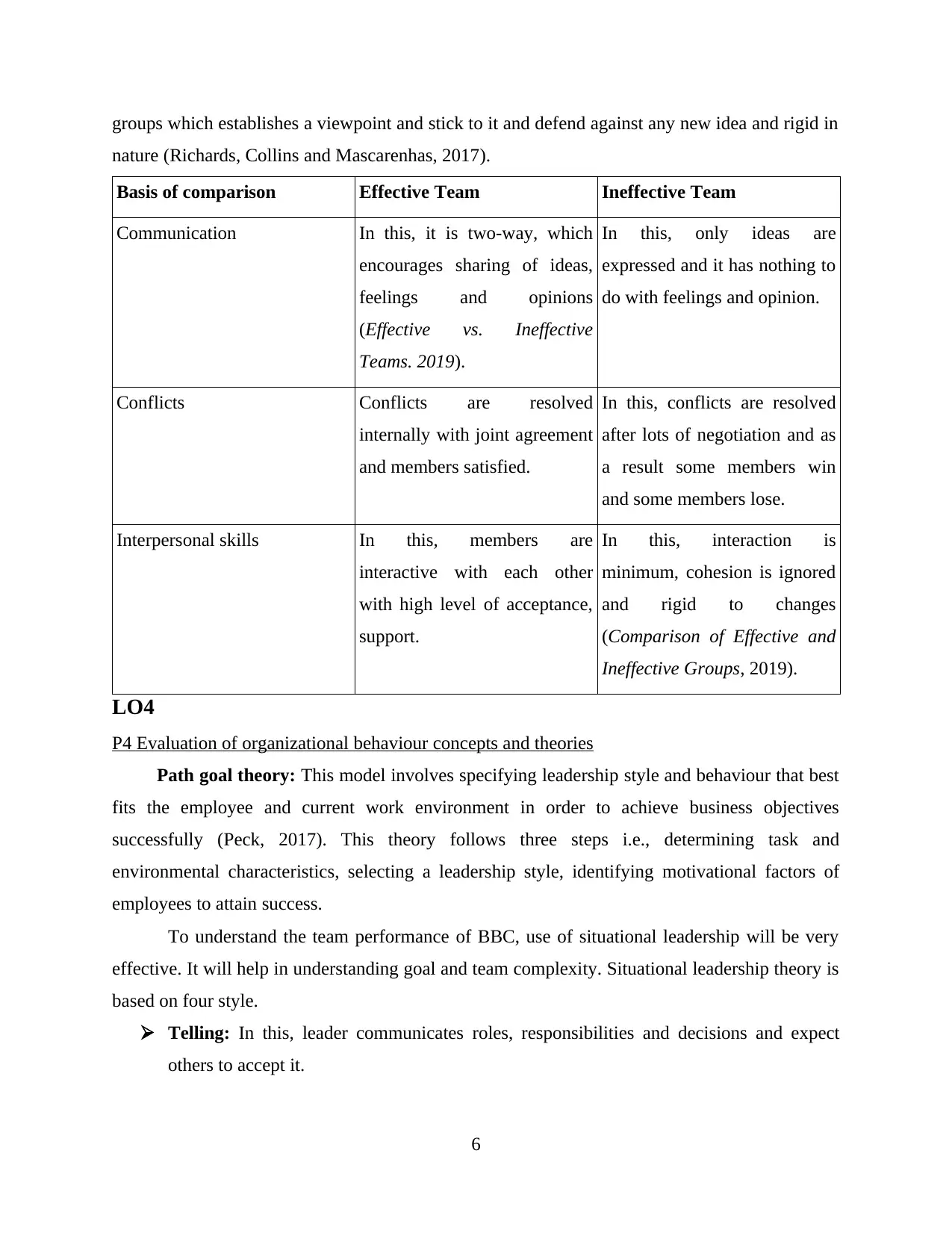
groups which establishes a viewpoint and stick to it and defend against any new idea and rigid in
nature (Richards, Collins and Mascarenhas, 2017).
Basis of comparison Effective Team Ineffective Team
Communication In this, it is two-way, which
encourages sharing of ideas,
feelings and opinions
(Effective vs. Ineffective
Teams. 2019).
In this, only ideas are
expressed and it has nothing to
do with feelings and opinion.
Conflicts Conflicts are resolved
internally with joint agreement
and members satisfied.
In this, conflicts are resolved
after lots of negotiation and as
a result some members win
and some members lose.
Interpersonal skills In this, members are
interactive with each other
with high level of acceptance,
support.
In this, interaction is
minimum, cohesion is ignored
and rigid to changes
(Comparison of Effective and
Ineffective Groups, 2019).
LO4
P4 Evaluation of organizational behaviour concepts and theories
Path goal theory: This model involves specifying leadership style and behaviour that best
fits the employee and current work environment in order to achieve business objectives
successfully (Peck, 2017). This theory follows three steps i.e., determining task and
environmental characteristics, selecting a leadership style, identifying motivational factors of
employees to attain success.
To understand the team performance of BBC, use of situational leadership will be very
effective. It will help in understanding goal and team complexity. Situational leadership theory is
based on four style.
Telling: In this, leader communicates roles, responsibilities and decisions and expect
others to accept it.
6
nature (Richards, Collins and Mascarenhas, 2017).
Basis of comparison Effective Team Ineffective Team
Communication In this, it is two-way, which
encourages sharing of ideas,
feelings and opinions
(Effective vs. Ineffective
Teams. 2019).
In this, only ideas are
expressed and it has nothing to
do with feelings and opinion.
Conflicts Conflicts are resolved
internally with joint agreement
and members satisfied.
In this, conflicts are resolved
after lots of negotiation and as
a result some members win
and some members lose.
Interpersonal skills In this, members are
interactive with each other
with high level of acceptance,
support.
In this, interaction is
minimum, cohesion is ignored
and rigid to changes
(Comparison of Effective and
Ineffective Groups, 2019).
LO4
P4 Evaluation of organizational behaviour concepts and theories
Path goal theory: This model involves specifying leadership style and behaviour that best
fits the employee and current work environment in order to achieve business objectives
successfully (Peck, 2017). This theory follows three steps i.e., determining task and
environmental characteristics, selecting a leadership style, identifying motivational factors of
employees to attain success.
To understand the team performance of BBC, use of situational leadership will be very
effective. It will help in understanding goal and team complexity. Situational leadership theory is
based on four style.
Telling: In this, leader communicates roles, responsibilities and decisions and expect
others to accept it.
6
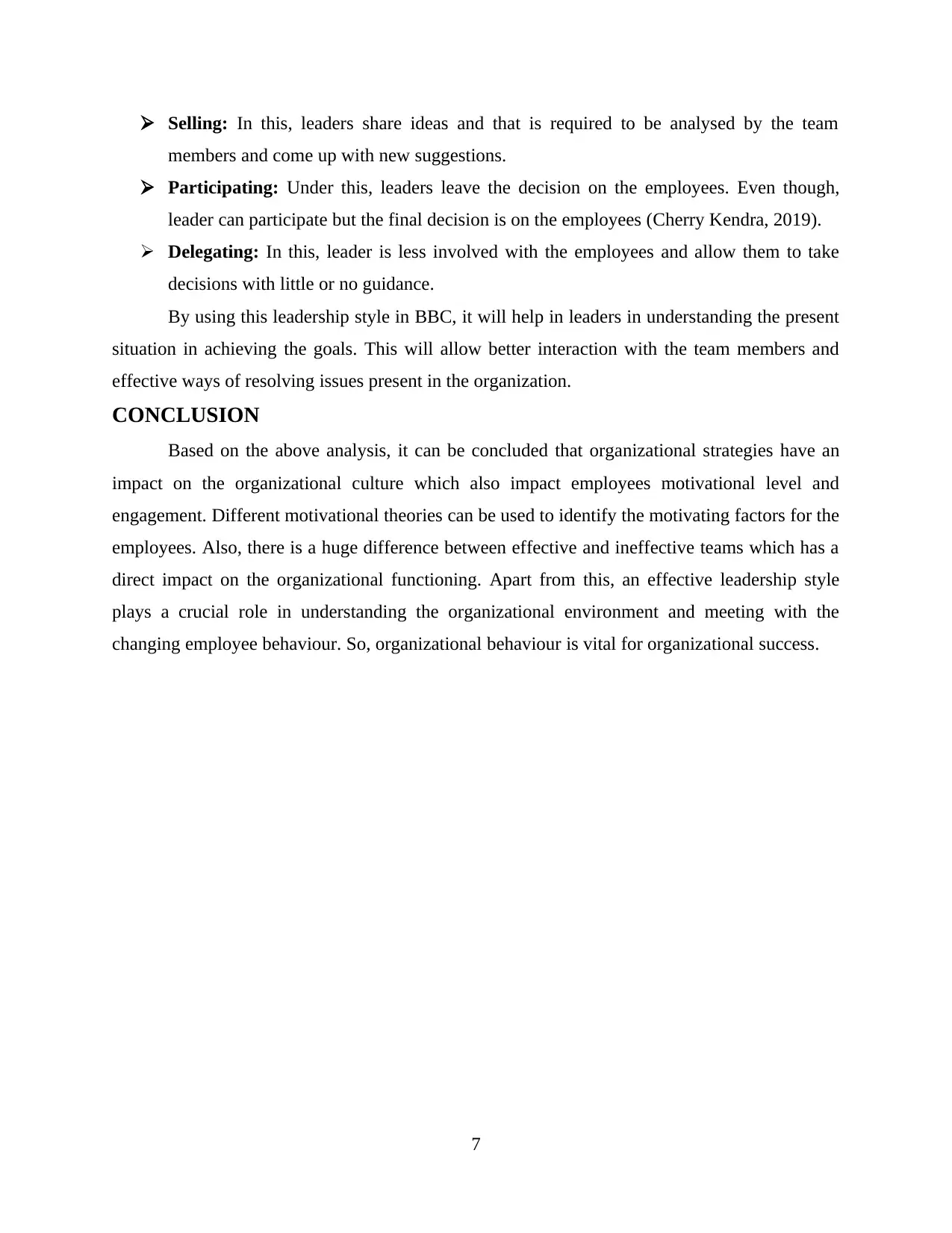
Selling: In this, leaders share ideas and that is required to be analysed by the team
members and come up with new suggestions.
Participating: Under this, leaders leave the decision on the employees. Even though,
leader can participate but the final decision is on the employees (Cherry Kendra, 2019).
Delegating: In this, leader is less involved with the employees and allow them to take
decisions with little or no guidance.
By using this leadership style in BBC, it will help in leaders in understanding the present
situation in achieving the goals. This will allow better interaction with the team members and
effective ways of resolving issues present in the organization.
CONCLUSION
Based on the above analysis, it can be concluded that organizational strategies have an
impact on the organizational culture which also impact employees motivational level and
engagement. Different motivational theories can be used to identify the motivating factors for the
employees. Also, there is a huge difference between effective and ineffective teams which has a
direct impact on the organizational functioning. Apart from this, an effective leadership style
plays a crucial role in understanding the organizational environment and meeting with the
changing employee behaviour. So, organizational behaviour is vital for organizational success.
7
members and come up with new suggestions.
Participating: Under this, leaders leave the decision on the employees. Even though,
leader can participate but the final decision is on the employees (Cherry Kendra, 2019).
Delegating: In this, leader is less involved with the employees and allow them to take
decisions with little or no guidance.
By using this leadership style in BBC, it will help in leaders in understanding the present
situation in achieving the goals. This will allow better interaction with the team members and
effective ways of resolving issues present in the organization.
CONCLUSION
Based on the above analysis, it can be concluded that organizational strategies have an
impact on the organizational culture which also impact employees motivational level and
engagement. Different motivational theories can be used to identify the motivating factors for the
employees. Also, there is a huge difference between effective and ineffective teams which has a
direct impact on the organizational functioning. Apart from this, an effective leadership style
plays a crucial role in understanding the organizational environment and meeting with the
changing employee behaviour. So, organizational behaviour is vital for organizational success.
7
⊘ This is a preview!⊘
Do you want full access?
Subscribe today to unlock all pages.

Trusted by 1+ million students worldwide
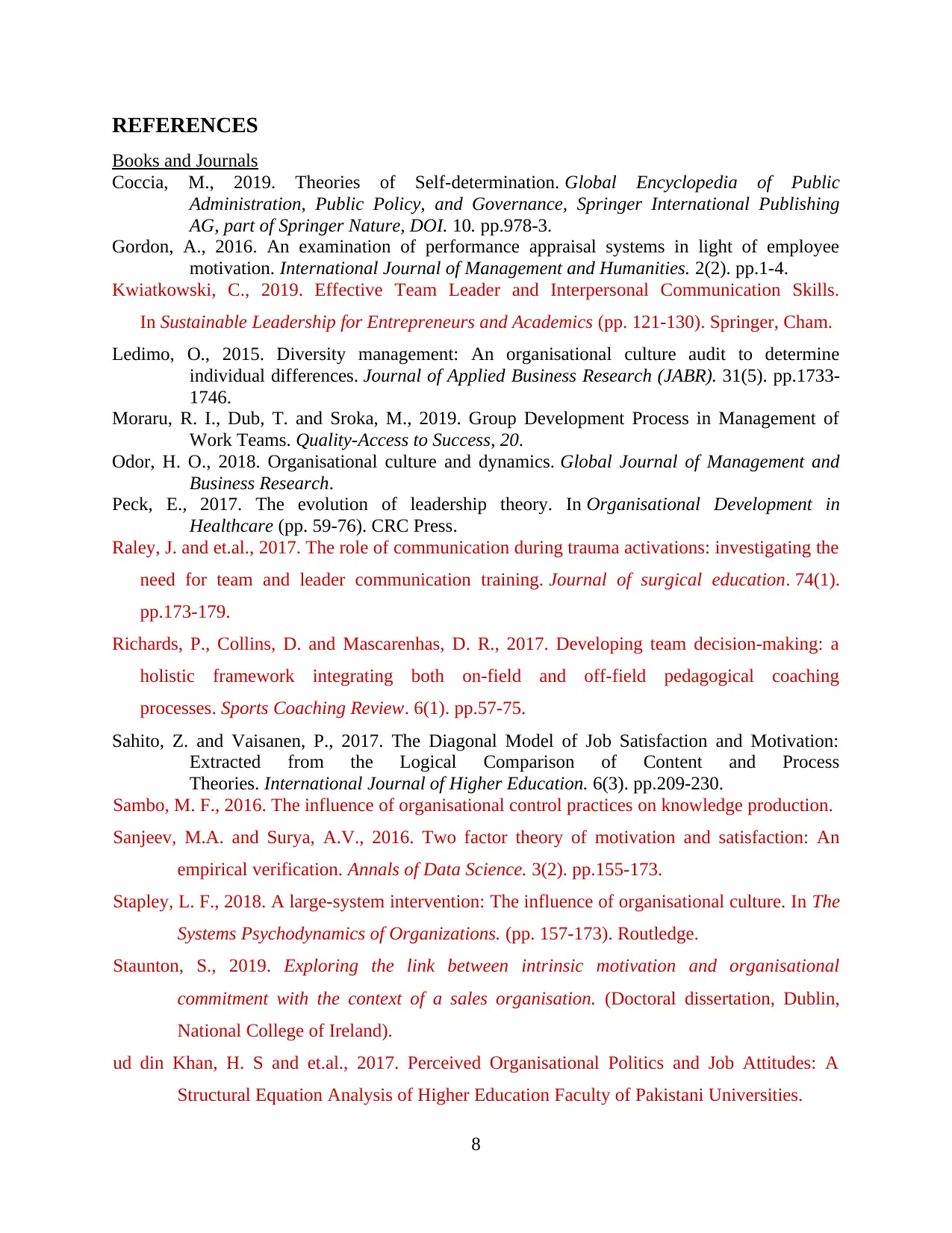
REFERENCES
Books and Journals
Coccia, M., 2019. Theories of Self-determination. Global Encyclopedia of Public
Administration, Public Policy, and Governance, Springer International Publishing
AG, part of Springer Nature, DOI. 10. pp.978-3.
Gordon, A., 2016. An examination of performance appraisal systems in light of employee
motivation. International Journal of Management and Humanities. 2(2). pp.1-4.
Kwiatkowski, C., 2019. Effective Team Leader and Interpersonal Communication Skills.
In Sustainable Leadership for Entrepreneurs and Academics (pp. 121-130). Springer, Cham.
Ledimo, O., 2015. Diversity management: An organisational culture audit to determine
individual differences. Journal of Applied Business Research (JABR). 31(5). pp.1733-
1746.
Moraru, R. I., Dub, T. and Sroka, M., 2019. Group Development Process in Management of
Work Teams. Quality-Access to Success, 20.
Odor, H. O., 2018. Organisational culture and dynamics. Global Journal of Management and
Business Research.
Peck, E., 2017. The evolution of leadership theory. In Organisational Development in
Healthcare (pp. 59-76). CRC Press.
Raley, J. and et.al., 2017. The role of communication during trauma activations: investigating the
need for team and leader communication training. Journal of surgical education. 74(1).
pp.173-179.
Richards, P., Collins, D. and Mascarenhas, D. R., 2017. Developing team decision-making: a
holistic framework integrating both on-field and off-field pedagogical coaching
processes. Sports Coaching Review. 6(1). pp.57-75.
Sahito, Z. and Vaisanen, P., 2017. The Diagonal Model of Job Satisfaction and Motivation:
Extracted from the Logical Comparison of Content and Process
Theories. International Journal of Higher Education. 6(3). pp.209-230.
Sambo, M. F., 2016. The influence of organisational control practices on knowledge production.
Sanjeev, M.A. and Surya, A.V., 2016. Two factor theory of motivation and satisfaction: An
empirical verification. Annals of Data Science. 3(2). pp.155-173.
Stapley, L. F., 2018. A large-system intervention: The influence of organisational culture. In The
Systems Psychodynamics of Organizations. (pp. 157-173). Routledge.
Staunton, S., 2019. Exploring the link between intrinsic motivation and organisational
commitment with the context of a sales organisation. (Doctoral dissertation, Dublin,
National College of Ireland).
ud din Khan, H. S and et.al., 2017. Perceived Organisational Politics and Job Attitudes: A
Structural Equation Analysis of Higher Education Faculty of Pakistani Universities.
8
Books and Journals
Coccia, M., 2019. Theories of Self-determination. Global Encyclopedia of Public
Administration, Public Policy, and Governance, Springer International Publishing
AG, part of Springer Nature, DOI. 10. pp.978-3.
Gordon, A., 2016. An examination of performance appraisal systems in light of employee
motivation. International Journal of Management and Humanities. 2(2). pp.1-4.
Kwiatkowski, C., 2019. Effective Team Leader and Interpersonal Communication Skills.
In Sustainable Leadership for Entrepreneurs and Academics (pp. 121-130). Springer, Cham.
Ledimo, O., 2015. Diversity management: An organisational culture audit to determine
individual differences. Journal of Applied Business Research (JABR). 31(5). pp.1733-
1746.
Moraru, R. I., Dub, T. and Sroka, M., 2019. Group Development Process in Management of
Work Teams. Quality-Access to Success, 20.
Odor, H. O., 2018. Organisational culture and dynamics. Global Journal of Management and
Business Research.
Peck, E., 2017. The evolution of leadership theory. In Organisational Development in
Healthcare (pp. 59-76). CRC Press.
Raley, J. and et.al., 2017. The role of communication during trauma activations: investigating the
need for team and leader communication training. Journal of surgical education. 74(1).
pp.173-179.
Richards, P., Collins, D. and Mascarenhas, D. R., 2017. Developing team decision-making: a
holistic framework integrating both on-field and off-field pedagogical coaching
processes. Sports Coaching Review. 6(1). pp.57-75.
Sahito, Z. and Vaisanen, P., 2017. The Diagonal Model of Job Satisfaction and Motivation:
Extracted from the Logical Comparison of Content and Process
Theories. International Journal of Higher Education. 6(3). pp.209-230.
Sambo, M. F., 2016. The influence of organisational control practices on knowledge production.
Sanjeev, M.A. and Surya, A.V., 2016. Two factor theory of motivation and satisfaction: An
empirical verification. Annals of Data Science. 3(2). pp.155-173.
Stapley, L. F., 2018. A large-system intervention: The influence of organisational culture. In The
Systems Psychodynamics of Organizations. (pp. 157-173). Routledge.
Staunton, S., 2019. Exploring the link between intrinsic motivation and organisational
commitment with the context of a sales organisation. (Doctoral dissertation, Dublin,
National College of Ireland).
ud din Khan, H. S and et.al., 2017. Perceived Organisational Politics and Job Attitudes: A
Structural Equation Analysis of Higher Education Faculty of Pakistani Universities.
8
Paraphrase This Document
Need a fresh take? Get an instant paraphrase of this document with our AI Paraphraser
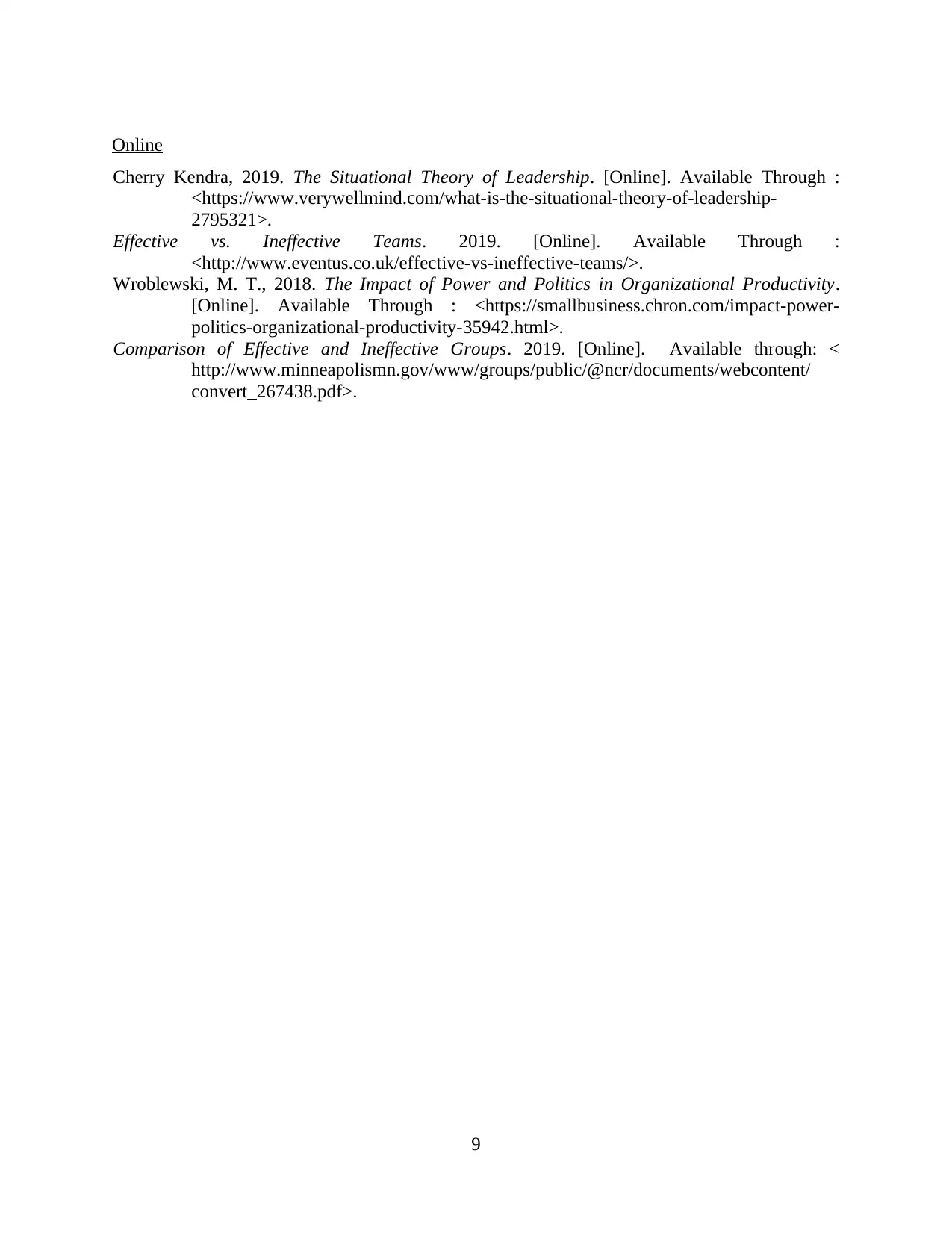
Online
Cherry Kendra, 2019. The Situational Theory of Leadership. [Online]. Available Through :
<https://www.verywellmind.com/what-is-the-situational-theory-of-leadership-
2795321>.
Effective vs. Ineffective Teams. 2019. [Online]. Available Through :
<http://www.eventus.co.uk/effective-vs-ineffective-teams/>.
Wroblewski, M. T., 2018. The Impact of Power and Politics in Organizational Productivity.
[Online]. Available Through : <https://smallbusiness.chron.com/impact-power-
politics-organizational-productivity-35942.html>.
Comparison of Effective and Ineffective Groups. 2019. [Online]. Available through: <
http://www.minneapolismn.gov/www/groups/public/@ncr/documents/webcontent/
convert_267438.pdf>.
9
Cherry Kendra, 2019. The Situational Theory of Leadership. [Online]. Available Through :
<https://www.verywellmind.com/what-is-the-situational-theory-of-leadership-
2795321>.
Effective vs. Ineffective Teams. 2019. [Online]. Available Through :
<http://www.eventus.co.uk/effective-vs-ineffective-teams/>.
Wroblewski, M. T., 2018. The Impact of Power and Politics in Organizational Productivity.
[Online]. Available Through : <https://smallbusiness.chron.com/impact-power-
politics-organizational-productivity-35942.html>.
Comparison of Effective and Ineffective Groups. 2019. [Online]. Available through: <
http://www.minneapolismn.gov/www/groups/public/@ncr/documents/webcontent/
convert_267438.pdf>.
9

10
⊘ This is a preview!⊘
Do you want full access?
Subscribe today to unlock all pages.

Trusted by 1+ million students worldwide
1 out of 12
Related Documents
Your All-in-One AI-Powered Toolkit for Academic Success.
+13062052269
info@desklib.com
Available 24*7 on WhatsApp / Email
![[object Object]](/_next/static/media/star-bottom.7253800d.svg)
Unlock your academic potential
Copyright © 2020–2026 A2Z Services. All Rights Reserved. Developed and managed by ZUCOL.





